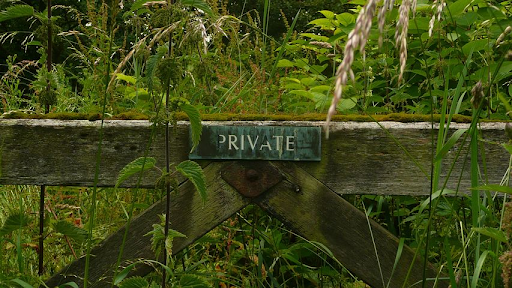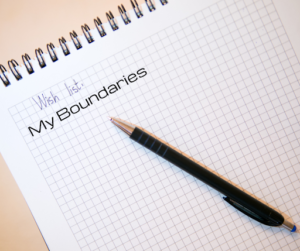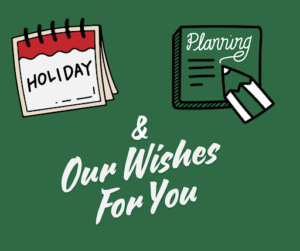Boundaries and grief.
When in grief, healthy boundaries may be the furthest thing from your mind. However, it’s a good topic to check in with so that you are getting your needs met and others aren’t overstepping their boundaries.
Boundaries are defined as the ability to withstand or recover quickly from difficult conditions. Webster’s defines them as the ability to become strong, healthy, or successful again after a change happens.
Boundaries are saying yes to what you want to and no to what you don’t want and keeping toxic people’s effects reduced.
Teresa’s Boundaries Journey
I wasn’t familiar with the term boundaries until I started my coach training in 2014. It was there I delved deeply into understanding what they were, how to set them and then practice with my own family and friends. Wow, what a positive difference boundaries make in my personal and professional boundaries. I’ve seen what a difference it makes in my client’s lives as well.
When Kris died, I wasn’t thinking of boundaries as I wasn’t raised to know or understand what healthy boundaries were. So I allowed anyone who wanted to help me “help.” Only to find that some people’s intentions were not healthy for me or my family. Grief can make the best of people do, say and act in the most odd ways.
I only wish I had known what healthy boundaries looked like and when to step up and say that’s not working for me. Asking for what I need is still a challenge for me to this day. However, with practice it continues to become easier.
Jeni’s Struggles with Boundaries
Boundaries have been hard for me throughout my life as I grew up with an abusive father who crossed into many areas where he should have been instilling boundaries or reinforcing boundaries in my life. After Bob died, I totally lost all idea of boundaries and, as a result, allowed many too much leeway in my life. I was at a loss for pretty much anything and relied heavily on those around me to make my decisions. It took me a few years to come out of the grief fog and realize what I had allowed to happen. I had to reach out to those outside my circle (coaches, counselors) to help me in identifying healthy boundaries and ways to instill them in my life.
Today, I have pretty healthy boundaries and a strong sense of what they are and how to use them in my life. However, I have had to take ownership of what I allowed to happen and the consequences of what occurred. My only justification is that my world was turned upside down and I did what I could to survive each moment. You do the best you can until you know better and then….you do better.
While we need to rely on our support systems in our times of grief, my advice to others would be to also do your best to sort the good advice/help from the bad and find ways to remove yourself from the toxic elements that may try to enter your grief journey. If you do not have anyone in your circle that will help you create/maintain boundaries, you may want to consider reaching outside your circle to a coach or counselor to assist you in having healthy boundaries. Also, realize that you are doing your very best and give yourself the grace to make mistakes and move forward with new knowledge.
If it helps, keep a list of what you would like to have done and what you would not like to happen. Use this as a reference when someone offers to help or as a way to reinforce your efforts to keep unhealthy assistance out of your life. Remember that this is always YOUR journey and you have the right/ability to direct the course even when you are at your weakest moments.
Setting Healthy Boundaries
Let’s take a look at setting some healthy boundaries. Here’s a checklist to get you started. You may want to journal your boundary work and keep a living document. Boundaries change as relationships change.
Boundaries Checklist
- Realize that boundaries are a sign of healthy living and relationships.
- Acknowledge you have boundaries and they are uniquely yours. There are no right or wrong boundaries. They just are
- Think of setting personal boundaries as a means of loving, honoring, and taking care of yourself.
- Consider how your boundaries are working or not working for you?
- What might you want to do differently? What might be healthier
- Define what your boundaries are and why they are important to you.
- You may have a home and work set of boundaries.
- Communicate – Make a plan to communicate your boundaries to those involved with a boundary.
- Communicate in a loving caring manner that helps the other parties know how to respect your boundaries.
- Keep it short and simple.
- If you cannot keep calm and loving while communicating, then wait until you can.
- Setting them in a negative emotional state isn’t likely to result in the best solution.
- Consequences – Have a plan of how you will respond when your boundary has been overstepped.
- It’s going to happen and it’s not personal. It took a long time to form the habit of overstepping and not setting boundaries. It will take time to change the behavior for both you and the overstepper. Acknowledge it takes time and practice to change habits and form a new behavior.
- Stand firm in your boundaries and what you expect. Restate what you want calmly. We are 200% aware that when it’s been overstepped it’s not always easy to be calm, do your best.
- Celebrate the small steps along the way. Thank others and celebrate when your boundary has been respected. It takes time and shows progress.
May you have the strength to have/set boundaries in your journey and may you be able to reach out for assistance when you cannot.
Peace and Blessings to you.
Please comment and share your experiences. If you have resources please share with our community.
Peace, Blessings & Love,
Teresa & Jeni
PS: A few boundaries resources that may be of use.




